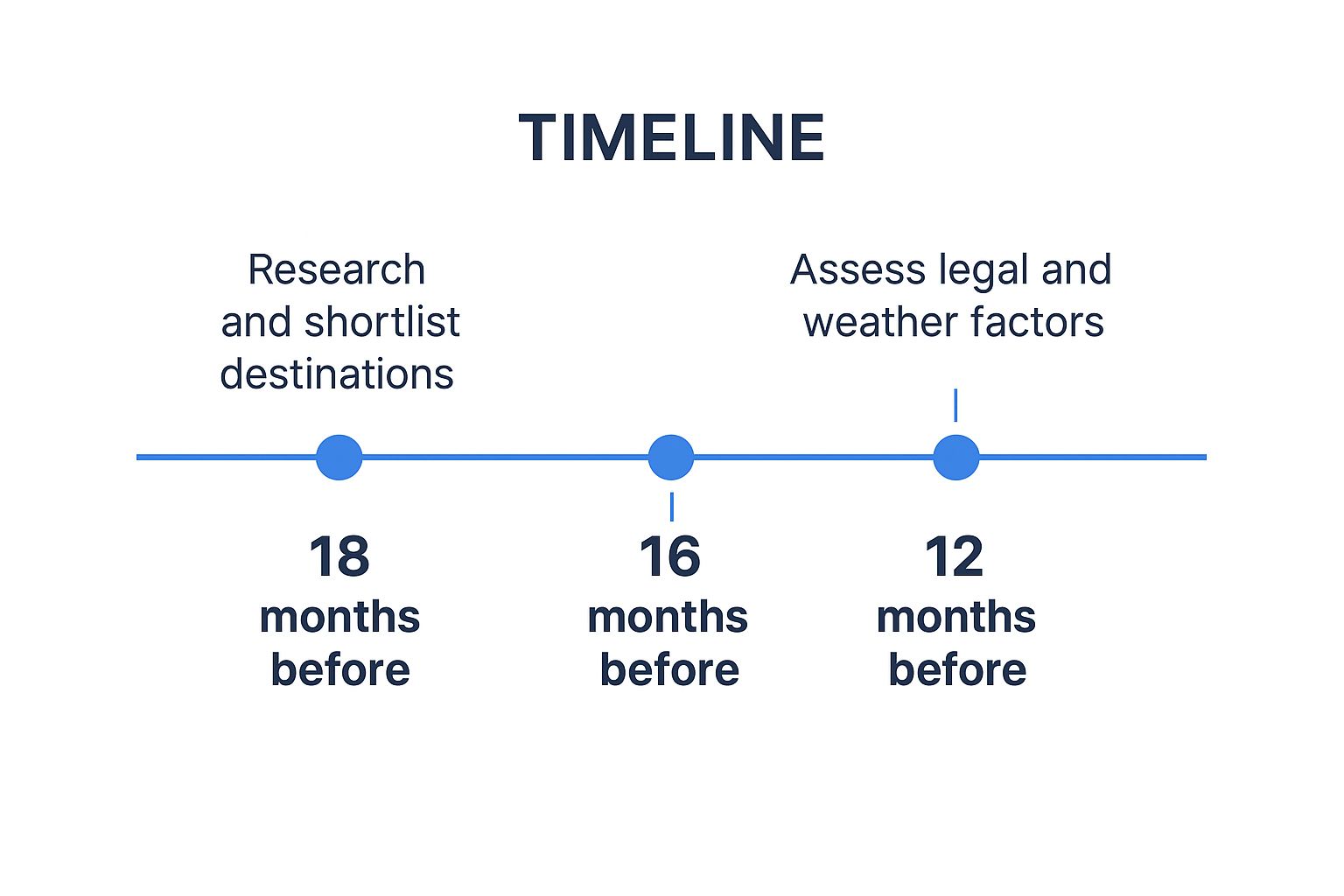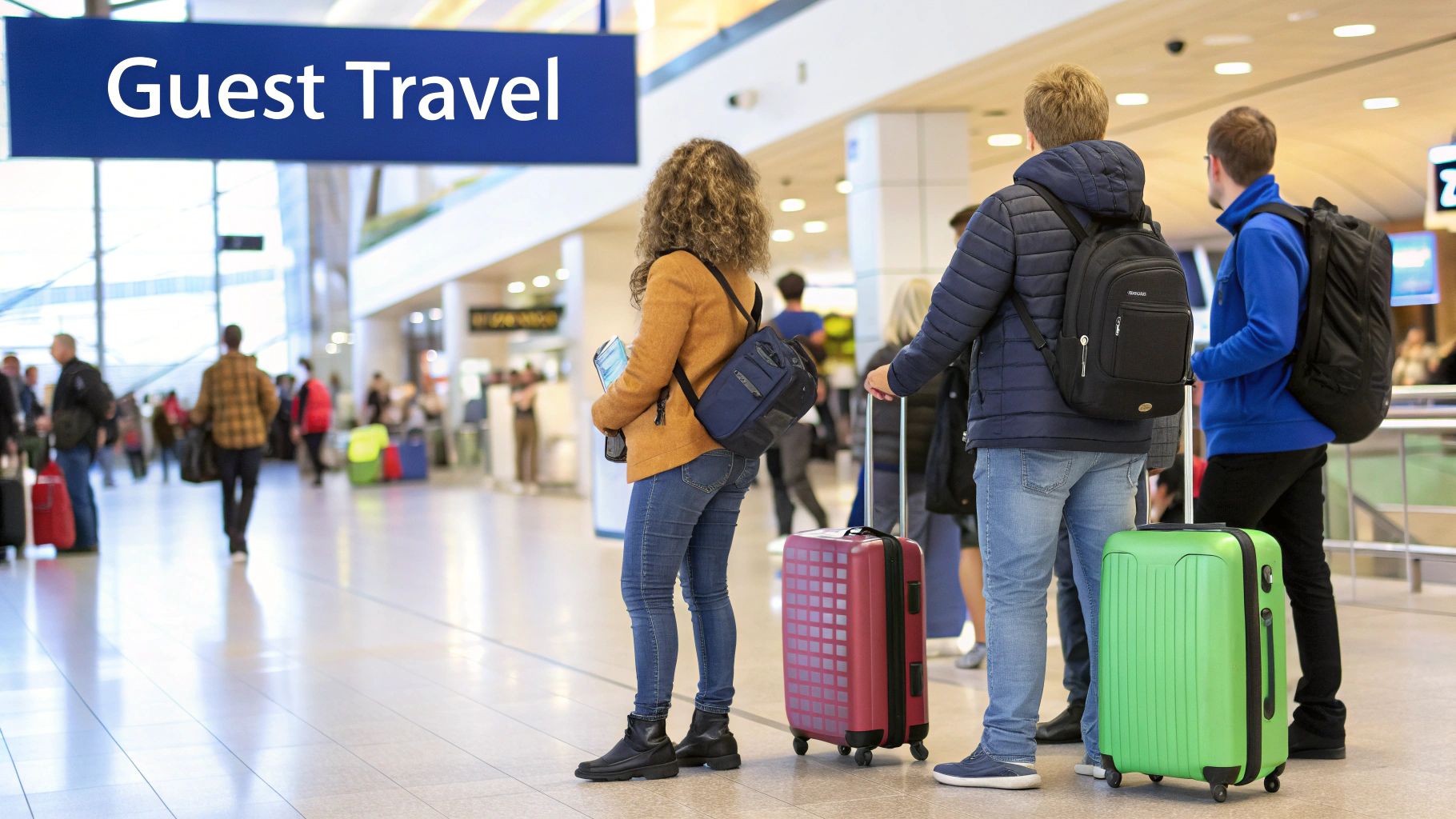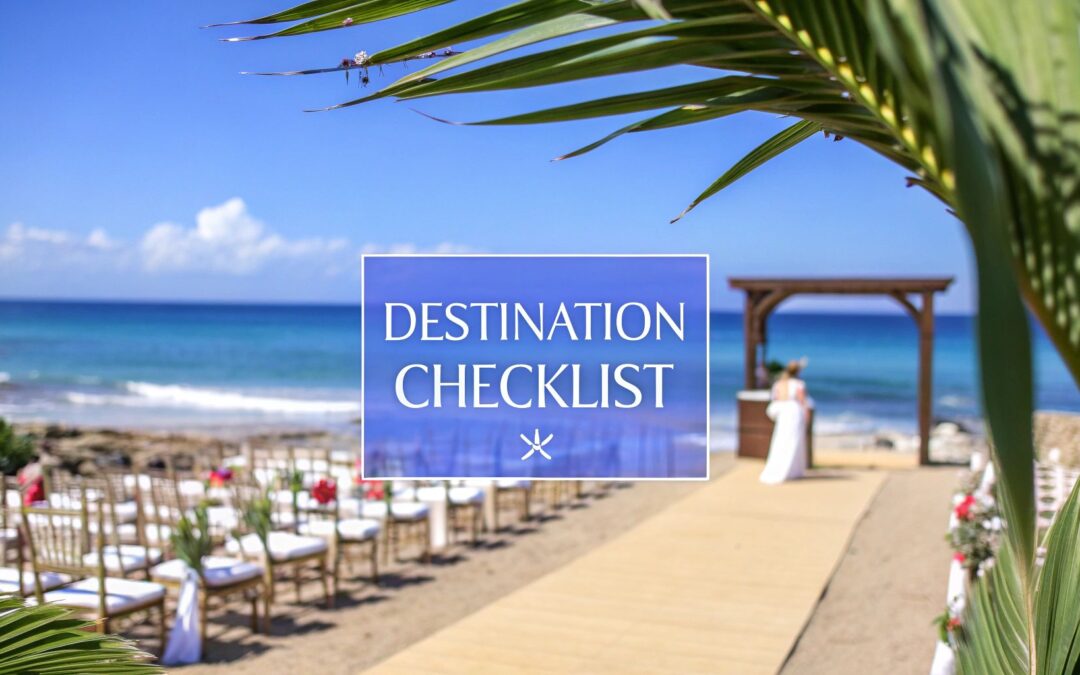Planning a destination wedding is more than booking a venue; it’s about executing a flawless multi-day luxury experience for you and your guests. The logistics—from navigating international marriage laws to coordinating vendors across time zones and managing guest travel from hubs like Miami International Airport—can quickly become a full-time job. This is where a detailed, expert-led approach transforms a complex process into a seamless journey. As a Circle of Excellence luxury travel advisor (top 5% at Nexion), I’ve designed this comprehensive destination wedding planning checklist to guide you through every critical step, ensuring no detail is overlooked.
We’ll move beyond generic advice to provide the actionable, concierge-level insights needed to execute a flawless celebration, whether you’re dreaming of a Tuscan villa or a beachfront ceremony in the Caribbean. This guide tackles the specific challenges of planning from afar, including managing currency exchange, securing guest room blocks, and vetting international vendors. While a standard timeline is a great starting point, the added layers of travel and legalities require a specialized roadmap. For a general approach, you might consult an ultimate wedding planning checklist and timeline.
Our focus here is on the unique, high-stakes details that define a destination event. From understanding residency requirements in Mexico to arranging private group transportation from the airport in Greece, this checklist is your blueprint for a stress-free, expertly coordinated wedding abroad.
Key Takeaways:
- Start Early & Strategically: Begin planning 12-18 months in advance, focusing first on the destination, venue, and legal requirements, as these decisions influence all subsequent steps.
- Logistics are Paramount: Meticulous coordination of guest travel, accommodations, local vendors, and on-the-ground transportation is the backbone of a successful destination wedding.
- Budget Beyond the Venue: A robust budget must account for currency fluctuations, international transaction fees, vendor travel costs, and comprehensive travel and wedding insurance.
- Expert Guidance is Invaluable: Partnering with a specialist like Explore Effortlessly simplifies complex logistics, unlocks VIP perks through our global network, and provides peace of mind. We handle the intricate details so you can enjoy every moment. Let us design your perfect wedding escape: Plan my destination wedding.
1. 12–18 Months Out: Choose the Perfect Destination and Venue
The first and most impactful decision in your destination wedding planning checklist is selecting the location and venue. This choice, made 12 to 18 months in advance, sets the stage for every other detail, from your budget and guest list to the overall aesthetic and experience. It’s about finding the perfect harmony between your dream wedding vision and the practical realities of travel, logistics, and legal requirements.
Harmonizing Vision with Practicality
Many couples fall in love with a stunning image on social media without considering the underlying complexities. A remote European estate may look breathtaking, but for Miami-based clients, it presents logistical challenges like multiple connecting flights and significant time zone differences for guests. In contrast, a Caribbean resort often offers direct flights from MIA, simplifying travel for everyone involved.
Your initial research should be a blend of inspiration and critical evaluation. Create a shortlist of destinations that match your desired vibe and then vet them against key criteria:
- Budget Alignment: Research the average cost of weddings in your preferred regions. A ceremony in a Tuscan vineyard, like those popularized by celebrity weddings, will have a vastly different price point than an all-inclusive package at a resort in the Dominican Republic.
- Guest Accessibility: Consider your guests’ demographics. Can they realistically travel to this location? Evaluate flight times, costs from major U.S. hubs, and visa requirements.
- Legal Marriage Requirements: Marriage laws vary significantly by country. Some, like Mexico, have residency requirements or require specific medical tests, which can complicate the process.
- Climate and Seasonality: Look beyond the “best time to visit.” Investigate shoulder seasons for better pricing and fewer crowds, but also be aware of potential weather risks like hurricane season in the Caribbean (June-November).
Expert Insight: A luxury travel advisor is your most valuable asset during this phase. As a CLIA Accredited Cruise Counselor and travel expert, I provide curated shortlists of pre-vetted venues that align with your specific criteria, saving you dozens of hours of research and preventing costly booking errors.
The Venue Selection Timeline
The following timeline illustrates the key milestones in choosing your destination and venue, a crucial part of any comprehensive destination wedding planning checklist.

This strategic progression ensures you move from broad research to a final, confident decision without missing critical evaluation steps. Booking your venue 12 months out is essential for securing your preferred date, especially at popular, in-demand properties.
Actionable Tips for a Smart Decision
To navigate this crucial stage effectively, it’s vital to move beyond inspiration and into tactical planning.
Visit If Possible: A site visit is the best way to experience a venue’s ambiance and service quality firsthand.
- Negotiate Packages: Many destination venues offer packages that bundle services. We leverage our relationships to negotiate customizations and special perks on your behalf.
- Check Local Calendars: Research local holidays or major events that could coincide with your date, as they can impact travel costs and hotel availability for your guests.
2. 9–12 Months Out: Understand Legal Requirements and Documentation
Navigating the legal landscape of a foreign country is a non-negotiable step in your destination wedding planning checklist. This phase, tackled 9 to 12 months before your date, ensures your marriage is legally binding in both the destination and your home country. Overlooking these critical details can turn your dream ceremony into a symbolic gesture with no legal standing, creating significant complications down the line.
Harmonizing Vision with Practicality
The romantic ideal of a spontaneous European wedding often collides with the reality of bureaucratic red tape. Each country has its own unique set of rules that can be complex and time-consuming to fulfill. For instance, a U.S. couple dreaming of a wedding in France must first complete a civil ceremony at the local mairie (town hall), which has strict residency and documentation requirements.
Your research must go beyond aesthetics and delve into the specific legalities of your chosen destination. A seemingly simple requirement can have a cascading effect on your entire timeline.
- Residency Requirements: Some destinations mandate that you reside in the country for a specific period before your ceremony. The Bahamas requires a 24-hour residency period, while other locations can demand much longer stays.
- Required Documentation: This varies wildly. Italy requires a Nulla Osta certificate from your home country’s consulate, while parts of Mexico may require blood tests conducted locally within a tight timeframe (e.g., 14 days) before the wedding.
- Witness Regulations: The number of witnesses required and whether they can be local hires or must be from your party is another detail to confirm.
- Apostille Certification: To ensure your foreign marriage certificate is recognized in the U.S., it often needs an apostille stamp, an additional step that takes time to process after the wedding.
Expert Insight: Many of my clients opt for a symbolic ceremony abroad and handle the legal paperwork at their local city hall before they travel. This strategy completely separates the romance from the bureaucracy, allowing you to fully enjoy your destination event without the stress of document deadlines and official appointments.
The Legal Paperwork Timeline
This strategic progression highlights the critical milestones for ensuring your marriage is legally recognized. Starting this process well in advance is a cornerstone of any successful destination wedding planning checklist.
- 9 Months Out: Begin researching the specific legal marriage requirements for your chosen country and locality.
- 6 Months Out: Start gathering all necessary documents, such as birth certificates, passports, and any required affidavits.
- 4 Months Out: Submit applications for any special licenses or certificates, like the Nulla Osta, and begin the translation process if required.
This timeline provides a buffer for potential government delays or requests for additional information, safeguarding your legal ceremony plans.
Actionable Tips for a Smart Decision
To navigate this complex process smoothly, focus on expert guidance and meticulous organization.
- Consult Local Experts: Hire a local wedding planner or a legal advisor specializing in destination weddings. Their experience with the local system is invaluable.
- Create a Document Checklist: Make a detailed list of every required document, including deadlines for submission and any translation or notarization needs.
- Keep Certified Copies: Travel with multiple certified copies of all essential documents, keeping them separate from the originals as a backup.
3. 9–12 Months Out: Set Budget and Manage Currency Exchange
With your destination locked in, the next critical step in your destination wedding planning checklist is to establish a comprehensive budget. This isn’t just about quoting venue packages; it’s about managing the financial complexities of an international event, including currency exchange rates, foreign transaction fees, and local pricing nuances. This phase, tackled 9 to 12 months out, grounds your vision in financial reality and prevents costly surprises down the line.
Harmonizing Vision with Practicality
A common pitfall for couples is underestimating the hidden costs associated with international planning. A $20,000 package for a European castle wedding sounds straightforward until you factor in fluctuating exchange rates between the USD and Euro, international wire transfer fees for vendor payments, and local VAT (Value Added Tax) that isn’t always included in initial quotes.
Your budget must be a living document that anticipates these variables. Start by categorizing every potential expense, from your own travel and attire to vendor payments and guest-related activities. Then, research the typical costs for your specific location:
- Caribbean & Mexico All-Inclusive Resorts: Often range from $12,000 to $35,000, with many costs bundled. The U.S. Dollar is widely accepted, simplifying transactions, but resort-specific fees can add up.
- European Castle or Vineyard: Typically cost between $20,000 and $50,000. These almost always involve payments in the local currency (Euros, Pounds), making exchange rate management crucial.
- Southeast Asia (e.g., Bali): Packages can range from $10,000 to $30,000, offering great value. However, you will be dealing with currencies like the Indonesian Rupiah, requiring careful tracking of exchange rates.
Expert Insight: I guide my clients through creating a multi-currency budget spreadsheet. This tool tracks payments in both USD and the local currency, allowing us to identify the most opportune times to make payments and leverage financial tools to minimize currency conversion losses, protecting your bottom line.
Budgeting for International Nuances
Managing an international wedding budget is fundamentally different from a domestic one. You need a strategy for handling foreign currencies and protecting your funds from market volatility. This is a key part of any successful destination wedding planning checklist.
This proactive financial planning ensures transparency and prevents the stress of unexpected costs, allowing you to focus on the celebratory aspects of your wedding.
Actionable Tips for a Smart Decision
To effectively manage your destination wedding finances, adopt the mindset of an international project manager. Your financial strategy is as important as your design aesthetic.
- Open a Fee-Free Bank Account: Consider opening a multi-currency bank account or using a credit card with no foreign transaction fees for all wedding-related expenses.
- Budget a Contingency Fund: Allocate an extra 10-15% of your total budget specifically for currency fluctuations and unforeseen international costs.
- Research Tipping Customs: Tipping culture varies dramatically worldwide. Research the local customs for all your vendors (planners, photographers, drivers) and factor these amounts into your budget from the start. For more information, you can find a guide to creating a smart travel budget on exploreeffortlessly.com.
4. Coordinate Guest Travel and Accommodations
Once the venue is secured, the next critical phase in your destination wedding planning checklist is managing guest logistics. This step involves organizing group travel, securing accommodation blocks, and providing clear, comprehensive information to ensure everyone arrives smoothly and safely. It’s about transforming a potentially stressful travel process into a seamless and exciting part of the wedding experience for your loved ones.
Streamlining the Guest Experience
For guests, attending a destination wedding is a significant commitment of time and money. Your role, or that of your planner, is to simplify this commitment as much as possible. This means thinking beyond just the wedding day and considering their entire journey, from booking flights to checking into their hotel. A well-organized travel plan demonstrates care and consideration, setting a positive tone for the celebration.

Your approach to guest travel should be strategic and communicative. A central hub for information is non-negotiable.
- Accommodation Blocks: Negotiate a room block at the host hotel or nearby properties. This offers guests a preferred rate and the convenience of staying together. We handle the contract negotiation to ensure favorable terms.
- Travel Information Hub: Create a detailed wedding website. This should be the single source of truth for flight recommendations, hotel booking links, ground transportation details, and passport or visa requirements.
- Transportation Logistics: Simplify arrivals and departures. For guests arriving from a major hub like Miami’s MIA to a resort in Mexico, this could involve arranging airport transfers via a private, pre-booked shuttle service—a key detail in any thorough destination wedding planning checklist.
- Welcome and Itinerary: Prepare welcome bags with a printed itinerary, local maps, and key contact numbers. This small touch makes a huge difference in helping guests feel oriented and cared for upon arrival.
Expert Insight: I often create a tiered accommodation strategy for my clients. This includes the primary resort, a more budget-conscious option nearby, and perhaps a luxury villa for the wedding party. This accommodates different budgets and travel styles, increasing the likelihood that your most important guests can attend.
The Guest Coordination Process
Managing guest travel is an ongoing task that begins almost a year before the wedding. Send save-the-dates 8 to 12 months in advance, especially for international destinations, giving guests ample time to book flights and arrange time off. Your wedding website should go live at the same time, packed with all the preliminary travel details they will need to start planning their trip.
As the date approaches, send periodic reminders about booking deadlines for the room block and any group activities. Designating your travel advisor to handle all travel-related questions prevents you from being inundated with logistical queries.
Actionable Tips for a Smart Decision
To effectively manage guest travel and accommodations, focus on clear communication and thoughtful planning.
- Offer Price Point Variety: Provide two to three accommodation options at different price points to cater to all your guests’ budgets.
- Communicate Passport/Visa Needs: Clearly and repeatedly communicate any international travel requirements. Remind guests to check their passport expiration dates well in advance.
- Plan Group Activities: Organize optional group activities, like a welcome cocktail party or a day-after brunch. This fosters a sense of community and makes the trip more memorable for everyone involved.
5. 9–10 Months Out: Hire Local Vendors and Coordinate Services
Once your venue is secured, the next critical phase in your destination wedding planning checklist involves assembling your team of on-the-ground professionals. Hiring reliable local vendors nine to ten months in advance is essential. This includes your photographer, florist, musicians, and hair and makeup artists who understand the local market, climate, and cultural nuances, ensuring your wedding day runs smoothly and authentically.

Harmonizing Vision with Practicality
Selecting vendors from afar presents unique challenges, from language barriers to differing business practices. Your goal is to find professionals whose style resonates with your vision and who have a proven track record of excellence. It’s not just about finding a photographer; it’s about finding one who knows the best spots for sunset photos at your specific Mexican resort or a Tuscan florist who specializes in the rustic, olive-branch arrangements you envision.
Your vendor search should be a meticulous process of research, vetting, and clear communication. Create a priority list and vet each potential partner against key criteria:
- Portfolio and Style Alignment: Does their work match your aesthetic? A photographer specializing in dark, moody shots may not be the right fit for a bright, airy Caribbean beach wedding.
- Local Expertise: A local vendor offers invaluable knowledge. A French château’s preferred caterer will understand the kitchen’s capabilities, while a local mariachi band in Cancun adds an authentic touch that a traveling band cannot replicate.
- Client Reviews and References: Look for recent, detailed reviews on reputable platforms and don’t hesitate to ask for references from past clients, particularly those who also planned a destination wedding.
- Communication and Professionalism: Evaluate their responsiveness and clarity. Are they easy to communicate with across time zones? Do they provide clear, professional contracts?
Expert Insight: Vetting international vendors is one of the most time-consuming parts of destination planning. As your travel advisor, I leverage my global network of trusted, pre-vetted local partners, from florists in Florence to photographers in French Polynesia. This eliminates the risk of working with unproven suppliers and ensures a cohesive, high-quality team.
The Vendor Selection Process
The following steps outline a strategic approach to building your vendor team, a crucial component of any comprehensive destination wedding planning checklist.

This structured process helps you confidently hire a team that can execute your vision flawlessly, even from thousands of miles away. Finalizing contracts around the nine-month mark gives you ample time for detailed coordination.
Actionable Tips for a Smart Decision
To effectively manage this stage, focus on clear communication and diligent vetting.
- Schedule Video Calls: A face-to-face video call is non-negotiable. It helps you build rapport and assess their professionalism far better than email alone.
- Clarify All-In Costs: Ask for detailed proposals that include all potential fees, such as travel, taxes (like VAT in Europe), and service charges, to avoid budget surprises.
- Understand Local Payment Norms: Payment methods and schedules can vary. While U.S. vendors often use credit card portals, many international suppliers may require bank transfers. Confirm these details upfront.
6. 6–8 Months Out: Plan Transportation and Logistics
At the 6- to 8-month mark, the focus of your destination wedding planning checklist shifts to the crucial, often-overlooked element of logistics. Seamless transportation is the invisible thread that ties your entire wedding weekend together, ensuring guests and vendors move smoothly from airports to hotels and between event venues. This step is about more than just booking cars; it’s about choreographing a flawless experience that eliminates travel-related stress for everyone involved.
Harmonizing Vision with Practicality
Couples often envision a grand arrival or effortless guest movement without fully comprehending the coordination required. A stunning cliffside ceremony on a Greek island is only magical if guests aren’t left struggling to find their way up winding, narrow roads. Similarly, a multi-venue wedding at different Napa Valley wineries requires more than just providing addresses; it demands chartered transport to ensure safety and timeliness.
Your logistics plan must be a blend of your desired experience and on-the-ground reality. Begin by mapping out every required movement for guests, the wedding party, and vendors.
- Guest Movement: How will guests get from the airport to their accommodations? How will they travel between the hotel, ceremony site, and reception venue?
- Vendor Access: Do your photographer, florist, and caterer have reliable transportation? Do they need special vehicle access for setup, especially at remote or exclusive locations?
- Wedding Party Coordination: How will the bridal and groom’s parties travel throughout the wedding day? Keeping them together simplifies timing and photography.
- Contingency Plans: What is the backup plan for unexpected delays, vehicle issues, or bad weather? Having local taxi numbers or a pre-vetted car service on standby is essential.
Expert Insight: For our Miami-based clients hosting weddings in the Caribbean or Europe, we manage all ground transportation logistics. This includes coordinating with trusted local partners to arrange everything from luxury airport transfers to group shuttles, ensuring every logistical detail is handled with precision and care. I work with clients nationwide via virtual consultations to deliver this same level of service.
The Logistics Coordination Timeline
Mapping out your transportation needs well in advance is a non-negotiable part of a successful destination wedding planning checklist. This timeline ensures no detail is missed.
- 8 Months Out: Research and vet local transportation companies. Request quotes for airport transfers, group shuttles, and private cars.
- 7 Months Out: Finalize the number of guests needing transport based on early RSVPs and book the necessary vehicles.
- 6 Months Out: Confirm all transportation contracts. Share detailed itineraries, including flight numbers and addresses, with your chosen providers.
This structured approach prevents last-minute scrambles and ensures you secure the best vehicles and drivers for your event, which are often in high demand during peak wedding season.
Actionable Tips for a Smart Decision
To execute a flawless transportation plan, you must think like a logistics manager. Move beyond simply booking a bus and focus on the intricate details.
- Build in Buffer Time: Always add at least 20-30 minutes of buffer time to every travel leg to account for local traffic, unexpected delays, or guests running late.
- Provide Clear Instructions: Don’t assume guests know where to go. Provide them with a printed or digital schedule that includes pickup times, locations, and contact information for a transportation coordinator.
- Consider VIP & Accessibility Needs: Arrange for private, comfortable transport for immediate family and any guests with mobility challenges. Ensure vehicles are accessible and drivers are prepared to offer assistance.
7. Obtain Travel Insurance and Emergency Planning
An often-overlooked yet critical component of your destination wedding planning checklist is securing comprehensive insurance and establishing a robust emergency plan. This step is about creating a financial and logistical safety net, protecting your significant investment and ensuring peace of mind against unforeseen circumstances. From a hurricane disrupting your Caribbean celebration to a key vendor going out of business, the right coverage safeguards you from events far beyond your control.
Harmonizing Celebration with Caution
Couples can get so caught up in the excitement of planning that they neglect to prepare for the “what ifs.” A destination wedding involves complex logistics, international travel, and large financial deposits, all of which introduce unique risks not present in a local wedding. For instance, a vendor bankruptcy in a foreign country can be a nightmare to resolve without proper wedding insurance. Similarly, a medical emergency in a remote location requires a plan for quality care and potential evacuation.
Your approach to insurance should be as meticulous as your vendor selection. Evaluate policies that cover both the travel and the event itself:
- Wedding Insurance: This specifically protects your financial investments. It can cover losses if you need to cancel or postpone due to unforeseen reasons like illness, extreme weather, or even military deployment. It also often includes liability coverage.
- Travel Insurance: This covers trip-specific issues for you and your guests. Look for policies that include trip cancellation/interruption, medical emergencies, and lost or delayed baggage.
- Medical Coverage: Your domestic health insurance may not provide adequate coverage abroad. Confirm your policy’s international scope and consider supplemental medical travel insurance, especially with evacuation coverage.
- Contingency Planning: Beyond insurance, develop a clear plan. What happens if it rains during your outdoor ceremony? Who is the local emergency contact for all guests?
Expert Insight: I always advise clients to purchase insurance as soon as they make their first deposit. This maximizes their coverage window. The peace of mind that comes from knowing your six-figure wedding investment is protected against a hurricane or supplier failure is invaluable.
The Emergency Preparedness Timeline
A structured approach ensures all bases are covered well before you travel. Integrating this into your destination wedding planning checklist prevents last-minute scrambles and ensures all participants are informed.
- 6–9 Months Out: Purchase both wedding and travel insurance immediately after booking your venue and major vendors.
- 3–4 Months Out: Research local medical facilities near your venue and share this information with guests.
- 1 Month Out: Create and distribute a digital document to all guests containing local emergency numbers, the address of the venue and hotels, and key contact information for the wedding planner and a designated family member.
This proactive timeline transforms emergency planning from an afterthought into an integrated part of your wedding logistics, ensuring everyone feels safe and supported.
Actionable Tips for a Smart Decision
To effectively protect your event and your guests, move from general awareness to specific, actionable steps.
- Read the Fine Print: Carefully review policy exclusions. Many basic policies won’t cover cancellations due to specific named storms or known political unrest. Understand exactly what is and isn’t covered. For a detailed guide on selecting the right policy, you can learn more about how to pick travel insurance.
- Document Everything: Keep meticulous records of all payments and contracts. This documentation is essential if you need to file a claim.
- Inform Your Guests: Encourage your guests to purchase their own travel insurance. Provide them with recommendations and explain the benefits of being covered for their own travel disruptions or medical needs.
From Checklist to Flawless Execution
Navigating the intricate details of a destination wedding can feel like orchestrating a symphony in a foreign language. From decoding international marriage laws and managing currency conversions to coordinating vendors across time zones, the process is layered with complexities. This comprehensive destination wedding planning checklist was designed to serve as your roadmap, demystifying each critical step from venue selection and guest travel logistics to on-site coordination and emergency preparedness. By addressing each point, you move from a place of overwhelming uncertainty to one of empowered, organized clarity.
The true value of this checklist lies in its ability to highlight potential pitfalls before they become costly problems. It forces you to consider the granular details: the necessity of travel insurance, the nuances of vendor contracts in another country, and the logistical puzzle of transporting guests from Miami to a secluded villa in the Caribbean. Mastering these elements is the difference between a celebration fraught with stress and one that unfolds with effortless grace.
Your Effortless Destination Wedding Awaits
Ultimately, planning a destination wedding is a full-time job requiring specialized expertise and global connections. While a checklist provides the “what,” a dedicated travel advisor provides the “how.” I handle the intricate negotiations, the endless follow-ups, and the complex travel arrangements so you can focus on what truly matters: celebrating your union.
As a Circle of Excellence advisor, my role is to translate your vision into a perfectly executed reality. We take this destination wedding planning checklist and bring it to life, leveraging our industry partnerships to secure not just bookings, but elevated experiences and special perks through our partner relationships. From arranging VIP airport transfers for your family to coordinating with a trusted local florist in Tuscany, we manage every component. Your journey to “I do” should be joyful and exciting, not bogged down by contracts and spreadsheets. Let’s transform your dream into a beautifully orchestrated, unforgettable event.
The most detailed checklist is only the first step. To ensure a truly seamless and luxurious celebration, partner with an expert who can manage every detail on your behalf. At Explore Effortlessly, we specialize in transforming complex destination wedding logistics into perfectly executed, unforgettable experiences.
- Primary CTA: Plan my luxury destination wedding
- Secondary CTA: Book a complimentary consultation to discuss your ideas.
What’s Included When You Work With Us:
- End-to-end itinerary design and management
- Venue and vendor sourcing and negotiation
- Guest travel coordination and room block management
- Access to exclusive perks and VIP amenities
- 24/7 support throughout your wedding event
Testimonial Snippet:
“Karrah handled every single detail, from our private villa in the Caribbean to coordinating travel for 50 guests. Our wedding weekend was flawless and completely stress-free.” – Armina
Frequently Asked Questions
How far in advance should I start planning a destination wedding?
For a destination wedding, you should begin planning 12 to 18 months in advance. This extended timeline is crucial for securing your preferred venue and vendors, navigating legal requirements in a foreign country, and giving your guests ample time to arrange their travel and accommodations.
What is a realistic budget for a destination wedding?
Budgets vary widely based on location and guest count. A luxury Caribbean or Mexico wedding might start at $25,000-$50,000 for 50 guests, while a European villa wedding could be $50,000-$100,000+. A detailed budget should account for travel, accommodations, vendor fees, currency exchange, and a 10-15% contingency fund.
Do I need a local wedding planner if I have a travel advisor?
While a travel advisor handles all travel logistics, guest coordination, and accommodation contracts, a local wedding planner can be invaluable for on-the-ground, day-of coordination and managing local-only vendors. We often work in tandem with local planners to ensure a seamless experience from start to finish.
How do we handle the legal marriage paperwork abroad?
You have two main options: 1) Complete the legal marriage process in your home city before you travel and have a symbolic (but equally beautiful) ceremony at your destination. 2) Fulfill the legal requirements of your destination country, which may involve residency periods, specific documents, and translations. We advise on the best strategy for your specific circumstances.
What’s the best way to manage guest travel and accommodations?
The best approach is to negotiate a room block at one or two hotels to offer guests options and a preferred rate. Create a detailed wedding website with all travel information, including flight recommendations, hotel booking links, and ground transport details. A travel advisor can manage this entire process on your behalf, saving you and your guests significant time and stress.
About the Author:
Karrah Kazravan is the founder of Explore Effortlessly, a luxury travel agency based in Miami, FL, serving discerning clients nationwide. With prestigious credentials including Circle of Excellence (top 5% at Nexion) and CLIA Accredited Cruise Counselor, Karrah specializes in crafting bespoke travel experiences, from complex multi-destination journeys to flawless destination weddings and luxury cruises.
Love exploring effortlessly? Get weekly travel inspo, luxury deals, and behind-the-scenes stories straight to your inbox here.

